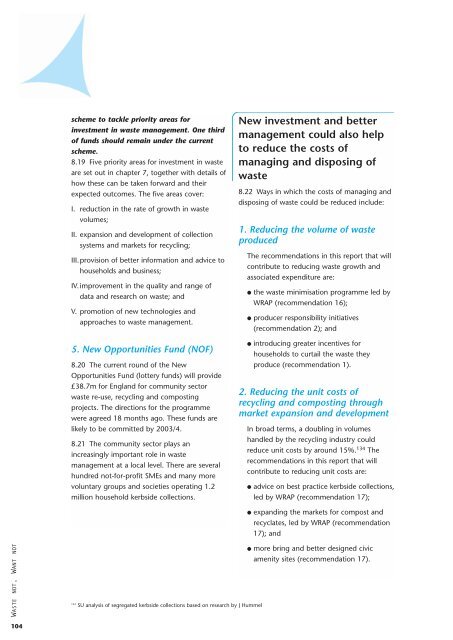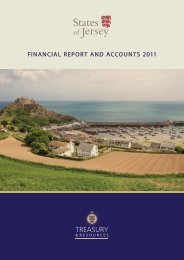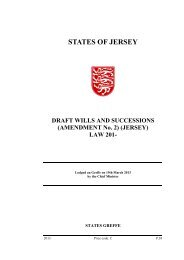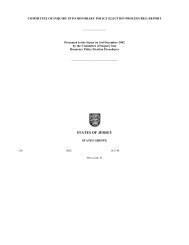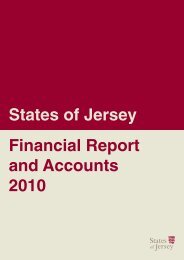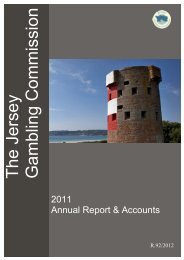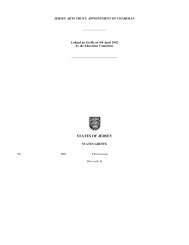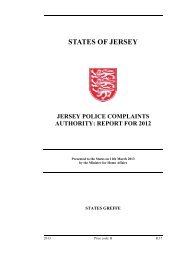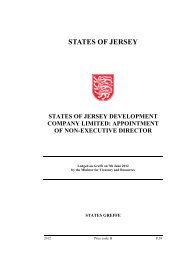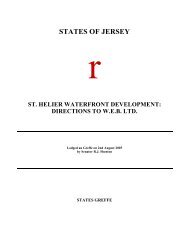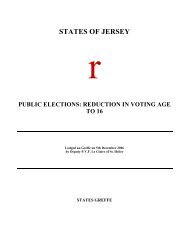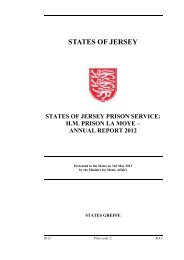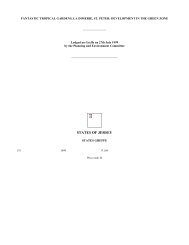Waste not want not - States Assembly
Waste not want not - States Assembly
Waste not want not - States Assembly
You also want an ePaper? Increase the reach of your titles
YUMPU automatically turns print PDFs into web optimized ePapers that Google loves.
scheme to tackle priority areas for<br />
investment in waste management. One third<br />
of funds should remain under the current<br />
scheme.<br />
8.19 Five priority areas for investment in waste<br />
are set out in chapter 7, together with details of<br />
how these can be taken forward and their<br />
expected outcomes. The five areas cover:<br />
I. reduction in the rate of growth in waste<br />
volumes;<br />
II. expansion and development of collection<br />
systems and markets for recycling;<br />
III.provision of better information and advice to<br />
households and business;<br />
IV.improvement in the quality and range of<br />
data and research on waste; and<br />
V. promotion of new technologies and<br />
approaches to waste management.<br />
5. New Opportunities Fund (NOF)<br />
8.20 The current round of the New<br />
Opportunities Fund (lottery funds) will provide<br />
£38.7m for England for community sector<br />
waste re-use, recycling and composting<br />
projects. The directions for the programme<br />
were agreed 18 months ago. These funds are<br />
likely to be committed by 2003/4.<br />
8.21 The community sector plays an<br />
increasingly important role in waste<br />
management at a local level. There are several<br />
hundred <strong>not</strong>-for-profit SMEs and many more<br />
voluntary groups and societies operating 1.2<br />
million household kerbside collections.<br />
New investment and better<br />
management could also help<br />
to reduce the costs of<br />
managing and disposing of<br />
waste<br />
8.22 Ways in which the costs of managing and<br />
disposing of waste could be reduced include:<br />
1. Reducing the volume of waste<br />
produced<br />
The recommendations in this report that will<br />
contribute to reducing waste growth and<br />
associated expenditure are:<br />
● the waste minimisation programme led by<br />
WRAP (recommendation 16);<br />
● producer responsibility initiatives<br />
(recommendation 2); and<br />
● introducing greater incentives for<br />
households to curtail the waste they<br />
produce (recommendation 1).<br />
2. Reducing the unit costs of<br />
recycling and composting through<br />
market expansion and development<br />
In broad terms, a doubling in volumes<br />
handled by the recycling industry could<br />
reduce unit costs by around 15%. 134 The<br />
recommendations in this report that will<br />
contribute to reducing unit costs are:<br />
● advice on best practice kerbside collections,<br />
led by WRAP (recommendation 17);<br />
● expanding the markets for compost and<br />
recyclates, led by WRAP (recommendation<br />
17); and<br />
WASTE NOT, WANT NOT<br />
134<br />
SU analysis of segregated kerbside collections based on research by J Hummel<br />
● more bring and better designed civic<br />
amenity sites (recommendation 17).<br />
104


